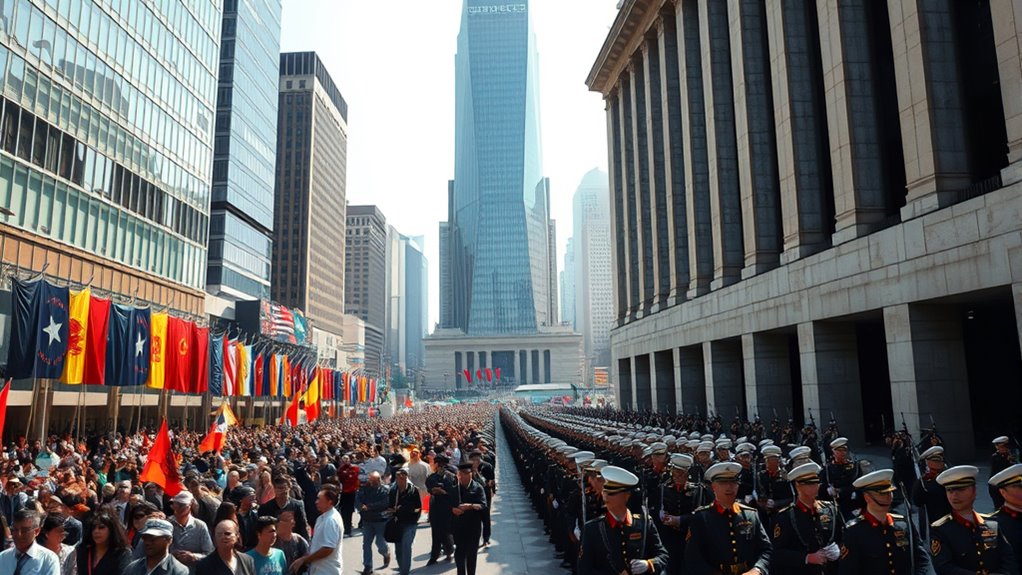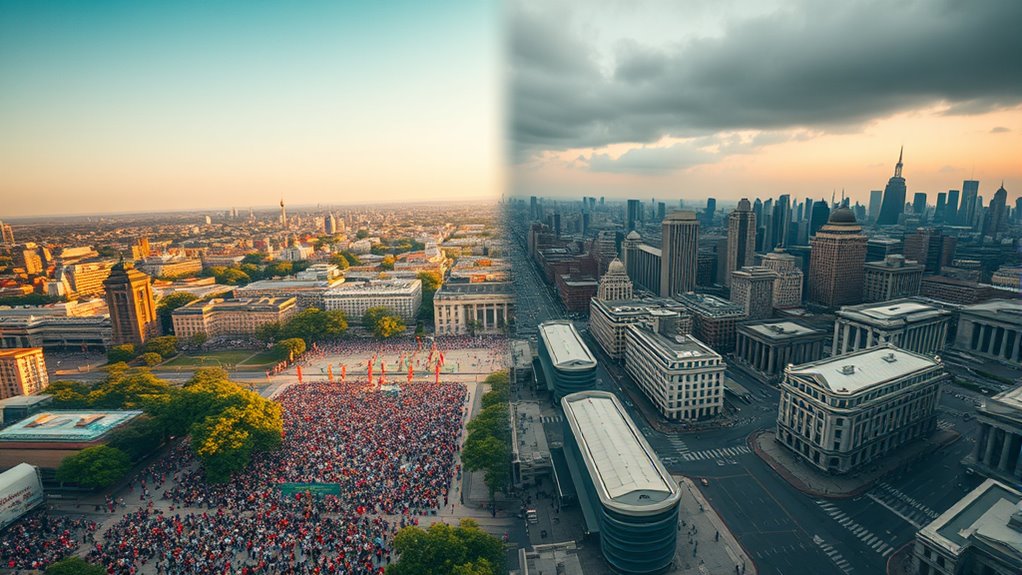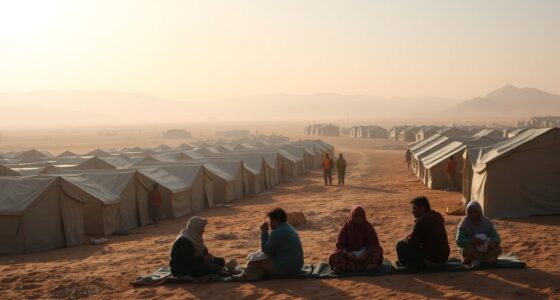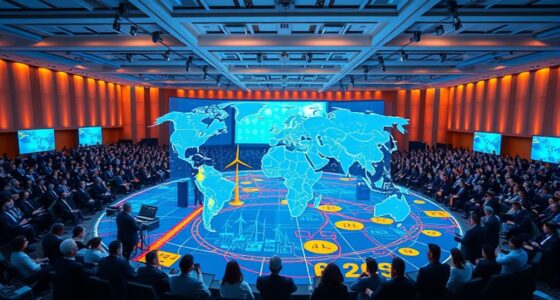In 2025, you’ll see democracy battling rising challenges like misinformation, election manipulation, and threats to civil liberties, which weaken civic trust. While some democracies strengthen their institutions and safeguard free speech, others face setbacks that make authoritarian models more appealing to their leaders. Election integrity and independent institutions remain essential for stability. Staying informed reveals how these global trends influence the future of governance, and understanding these changes will help you grasp what’s at stake worldwide.
Key Takeaways
- Some democracies are strengthening institutions, while others face setbacks from corruption and misinformation in 2025.
- Countries prioritizing election integrity and civil liberties tend to have more stable and resilient democracies.
- Authoritarian regimes manipulate electoral processes and suppress dissent, citing security to justify their actions.
- Independent institutions play a crucial role in maintaining checks, preventing manipulation, and supporting democratic resilience.
- Protecting election integrity and civil liberties remains essential to sustaining vibrant, legitimate democracies worldwide.

Have you ever wondered what truly distinguishes democracy from authoritarianism? At its core, democracy champions the idea that power resides with the people, allowing them to participate freely in decision-making processes. This participation hinges on election integrity, meaning elections are fair, transparent, and free from manipulation. When elections are credible, citizens can trust that their votes genuinely influence government actions, reinforcing the legitimacy of the democratic system. Conversely, in authoritarian regimes, elections often serve as a facade—rigged or controlled to maintain the ruling elite’s grip on power. Without election integrity, the voice of the ordinary citizen is silenced, and the system loses its legitimacy.
Election integrity is vital for democracy’s legitimacy and citizen trust.
Civil liberties are another essential element that sets democracies apart. These rights—freedom of speech, press, assembly, and religion—are protected and upheld, enabling individuals to express dissent, access information, and challenge authority without fear of repression. When civil liberties are respected, citizens can hold their leaders accountable, participate actively in civic life, and advocate for change. In authoritarian states, these liberties are often suppressed; dissenters face imprisonment, censorship is rampant, and the state controls all channels of information. The absence of civil liberties curtails individual freedoms and consolidates power within a narrow ruling class, making it nearly impossible for citizens to influence governance.
In 2025, global trends reveal a complex landscape. While some democracies are strengthening their institutions, others face setbacks due to corruption, misinformation, or erosion of civil liberties. Countries that prioritize election integrity and protect civil liberties tend to experience more stable, resilient democracies. They foster trust among their populations and are better equipped to adapt to challenges like economic crises or social unrest. Conversely, authoritarian regimes continue to tighten their grip by manipulating electoral processes and cracking down on dissent, often citing stability or national security as justification. These trends highlight that the health of democracy depends on safeguarding election integrity and civil liberties, which serve as pillars for genuine participation and accountability. Additionally, the role of independent institutions has become increasingly vital in maintaining checks and balances within democratic systems.
Understanding these differences helps you recognize the importance of defending democratic principles in your community and beyond. When election integrity is compromised or civil liberties are threatened, the foundation of democracy weakens, making it vulnerable to authoritarian tendencies. Conversely, supporting transparent elections and protecting freedoms ensures that governments remain accountable and responsive to the people’s needs. As you observe these trends worldwide, it becomes clear that maintaining and strengthening these core elements is essential for a vibrant, equitable, and enduring democracy.
Frequently Asked Questions
How Do Hybrid Regimes Influence Global Stability?
Hybrid regimes influence global stability by creating uncertainty through electoral manipulation and suppressing civil unrest, which can lead to unpredictable political environments. When you see these regimes, you might notice fragile institutions and increased tensions that threaten regional peace. Their unpredictable tactics often escalate conflicts, prompting international concern. This instability can spill over borders, affecting neighboring countries and complicating diplomatic efforts, ultimately making the global landscape more volatile and less predictable.
What Role Does Social Media Play in Democratic Transitions?
Like stepping into a 21st-century agora, social media fuels democratic shifts by enabling digital activism and mobilizing citizens. You harness platforms to share ideas, organize protests, and promote transparency. However, beware of misinformation campaigns that can undermine trust. Social media acts as both a catalyst and a challenge, empowering voices but also spreading falsehoods, shaping a complex landscape where your engagement can drive positive change or deepen division.
Are Authoritarian Governments More Effective During Crises?
You’ll find that authoritarian governments often appear more effective during crises because they can implement emergency governance and crisis management swiftly without the delays of democratic processes. This centralized control allows for rapid decision-making, mobilizing resources quickly. However, this efficiency can come at the expense of transparency and individual rights. While they may handle immediate threats better, long-term stability depends on balancing strong crisis management with accountability.
How Does Economic Inequality Impact Democratic Resilience?
Think of democracy as a delicate bridge that can wobble under the weight of economic inequality. When wealth disparity grows, it fuels political polarization, making it harder for people to unite. This weakens democratic resilience, causing trust to crumble and institutions to strain. You might notice that in such times, the very foundation of democracy shakes, risking collapse if disparities aren’t addressed. Addressing wealth disparity strengthens this essential bridge, ensuring democracy’s survival.
Can International Sanctions Promote Democratization?
International sanctions can promote democratization by using economic leverage and diplomatic pressure to encourage political reforms. When you apply targeted sanctions, you signal disapproval of authoritarian practices and incentivize leaders to adopt democratic reforms. However, be mindful that sanctions might also harm ordinary citizens or entrench authoritarianism if not carefully designed. Strategic, well-implemented sanctions can support democratization without unintended consequences, but they require careful diplomacy and monitoring.
Conclusion
Remember, the pen is mightier than the sword. As you observe the global shift in 2025, stay aware that democracy’s strength lies in your voice and participation. While authoritarianism may promise order, it often sacrifices freedom. You hold the power to shape your future—don’t underestimate the impact of your choices. Ultimately, history shows that a society that values liberty and open dialogue will thrive, proving that unity and conviction can overcome even the strongest tides of control.









